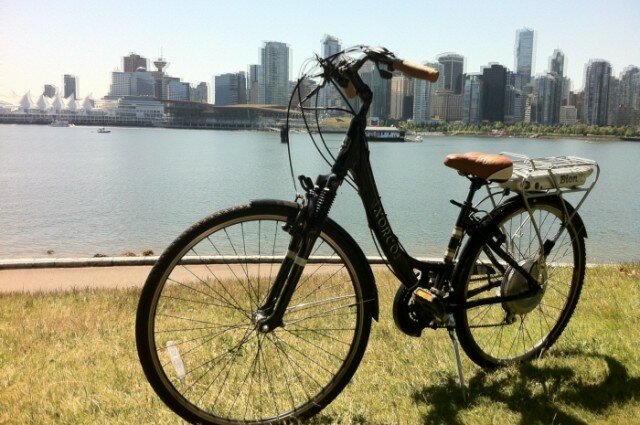
If you travel much, you’ve likely seen the e-bike craze for yourself. Touring by bicycle has long been the preferred way to see picturesque locales, but there was always the question of whether there was a hill involved. Or an Alp, in the case of Switzerland. While bicycle tours were once the property of the fitter among us, these days it’s difficult to find an existing Swiss bicycle tour company that doesn’t offer an e-bike upgrade, opening up new vistas for the more sedentary.
Exhibit A: The New York Times went for an electronically assisted Alpine spin last summer. Of course, in Switzerland, as writer Tim Neville, points out, e-bikes are just lying around:
For 50 Swiss francs a day, about $62 at $1.25 to the franc (with discounts for multiple days), you can rent an electric bike from one of 400 rental stations around the country and then set out on some 5,600 miles of well-marked bike paths.
Closer to home, it’s the same story in Victoria, BC. I rented a non-electric hybrid bike from Cycle BC, $24 for a full day, but when I got back I noticed a row of e-bikes along the wall. They’d converted a few of their Norco hybrids to e-bikes, via a BionX kit, with the battery pack strapped to the bike rack. A motorized hub drives the rear wheel. The e-bikes rent for slightly more ($9 per hour, $35 for the day), but they open up a full day of biking as well.
E-bikes are terrific for touring because you no longer need to worry so much about knowing the terrain, or estimating your fitness. If they can get up and down the Alps, they can handle hills elsewhere just fine. And if you haven’t been on a bike in a while, or ridden very far, touring all day on a bike can quickly come to seem overly optimistic. I always remember the pained look on a 60-ish man’s face, on a Caribbean bike tour, when the humidity, heat, and distance to the beach we were visiting overwhelmed him, and he had to pull up while the rest went on ahead.
Here in the Northwest, electric bikes have enjoyed an elevated popularity for years, at least according to Google, which ranks Oregon’s interest highest, Washington’s second. (“E-bike” is apparently a Californian term.) Seattle’s cliff-faced hills have long prompted a certain surreptitious interest in some kind of help getting up them. Electric Bikes Northwest was founded in the misty past of 1996. They remain the go-to source for e-bike information, with a guide to picking out the electric bike for you, and four different kinds of electric conversion kits.
But as of just two years ago, Sightline could run a whole series wondering where the e-bike excitement was. It still makes good reading, but the market is catching up fast. E-bikes can now be a low-end or high-end purchase. In Portland, you can pick up a top-of-the-line Kalkhoff for just $4,999. (Or you can rent a Kalkhoff and pretend you own a very expensive electric bike for the weekend.)
Here in Seattle, most of your new-bike options are in the $1,000 to $3,000 range. Besides Electric Bikes Northwest, there’s also Greenwood’s Seattle Electric Bike, who sell OHM electric bicycles; Pioneer Square’s Seattle E-Bike, who sell Prodeco when they’re in stock; and Laurelhurst’s Bicycle Center of Seattle, who have an electric bike department with a variety of brands. (They also sell an electric trailer, which will push your regular bicycle around.)
Conversion costs for an existing bike vary widely, depending upon the kit, its weight, power, and the type of motorized hub–whether it’s front or rear, or provides an integrated assist or a stand-alone boost.
Weight still remains an issue–electric bikes can push themselves around fine, but if you have to hoist a full-size e-bike at any time, you might notice if it weighs more than 50 pounds. (Smaller, lighter varieties fold up for traveling or storage on your boat.)
Speed tops out between 15 and 20 mph–that and power limited to 750 watts keeps the e-bike in the legal vicinity of a bicycle, as opposed to a scooter or motorcycle. The distance they can help you travel depends on you, how much you can or want to pedal, and how big a hill is involved. An “average” might be 20 miles, but speeding up an Alp, Neville reports, exhausted a battery in seven. (Of course, you can also buy a spare battery, just like you might with a cell phone.) In any event, batteries recharge quickly: they can get back to 90 percent of a charge in as little as 20 or 30 minutes, while taking three or four hours for a full charge.
